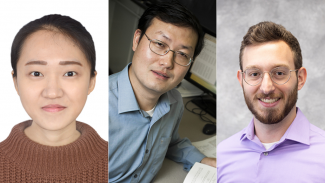Conducting projects on reducing air pollutants, understanding the dynamics of extreme materials and finding ways to use waste products, NETL research associates Hang Zhou, Shun-Li Shang and Samuel Flett, guided by their Lab mentors, strive to address some of the nation’s greatest energy challenges.
Motivated by finding ways to improve air quality in communities near power plants from her experiences growing up, Zhou studied thermal energy and power engineering, obtaining her bachelor’s and master’s degrees from Shandong University and the Chinese Academy of Sciences, respectively. After earning her doctorate in chemical engineering from the University of Utah, Zhou came to NETL through the Postgraduate Research Program (PGRP) with the Lab’s Computational Device Engineering team.
Zhou’s research focuses on the combustion and gasification of coal, biomass and plastic, specifically developing modeling tools for efficient use of fossil energy and minimizing the emission of pollutants. During her six months at NETL, Zhou has performed simulations and experiments to study the fluidization and gasification behavior of biomass and plastics.
“Producing energy and value-added products from biomass and plastics will be a critical step to solve our present energy and environment problems,” Zhou said. “NETL is a great place to start your career. There are a lot of interesting and promising projects. You can collaborate with people from various teams, universities and companies all over the world, which will be a great opportunity for you to have a better insight into the field and improve your sense of teamwork.”
Shang earned his doctorate in materials and metallurgy from the General Research Institute for Nonferrous Metals in Beijing, China. He joined the Delft University of Technology, Netherlands, in 2002, and then the Pennsylvania State University in 2005 for postdoctoral studies where he currently serves as a Research Professor. He joined NETL through the Faculty Research Program (FRP) and plans to collaborate with the Lab as a computational scientist.
“My research in the fields of computational materials science and engineering focuses on thermodynamics and kinetics, first-principles calculations and machine learning to study thermodynamic, diffusion and mechanical properties of ordered and disordered alloys, compounds and functional materials,” Shang said. “Computation is one of the best ways to understand the underlying physics of materials without doing extensive trial-and-error experiments that cost time and money.”
During 2023, Shang’s research at NETL is focused on the eXtremeMAT project to predict hydrogen embrittlement and mechanical properties of stainless steels and other metals, under the guidance from his mentor Michael Gao, a materials scientist at NETL. Shang’s background can help gain insights into fundamental understanding of the impact on materials properties from extreme environments using quantum mechanics-based modeling and simulations with validation.
Hydrogen power sourced from America’s abundant energy resources, when combined with carbon capture and storage technologies, has great potential to meet the energy needs of the modern, high-tech economy while also decarbonizing the power sector and addressing climate change. Much of NETL’s work has centered on this effort, but also finding new uses for waste products generated by producing energy.
Originally from Stafford, Virginia, Flett received his education from Virginia Tech in wildlife conservation. Flett developed an interest in microbiology before graduating in 2020 and later decided to pursue it as his career. He joined NETL through the Professional Internship Program (PIP).
Flett’s research at the Lab is focused on the Carbon Upgrading project, where the focus is taking waste gases, such as carbon dioxide, carbon monoxide and hydrogen, and converting them into value-added products. Bacteria contain naturally occurring metabolic pathways that can convert these gases into different organic acids. These organic acids, such as acetic acid, can be used in textiles, plastics, medicines, perfumes and much more. The project is focused on developing a unique mixed microbial community, originating from a sample taken from a coalbed methane formation.
“Optimizing this process will allow companies to repurpose their gas emissions to maximize profits, minimizing these gas emissions while simultaneously moving us closer to a net-zero carbon economy,” Flett said. “I have grown exponentially as a researcher during my time at NETL. My understanding of microbiology and molecular biology has reached depths that are incomparable to when I first started this position.”
NETL Research Scientist Djuna Gulliver, who serves as Flett’s mentor, noted how Flett has grown as a researcher since joining the Lab through PIP, becoming a subject matter expert with highly sophisticated equipment such as DNA sequencers and others.
“He collaborates seamlessly with the geomicrobiology group and is always a pleasure to be with,” Gulliver said. “His comprehension of experimental design and interpretation of results demonstrate the analytical thinking of a great researcher. I consider myself lucky to have him as my Research Associate.”
NETL is a U.S. Department of Energy national laboratory that drives innovation and delivers technological solutions for an environmentally sustainable and prosperous energy future. By leveraging its world-class talent and research facilities, NETL is ensuring affordable, abundant and reliable energy that drives a robust economy and national security, while developing technologies to manage carbon across the full life cycle, enabling environmental sustainability for all Americans.




